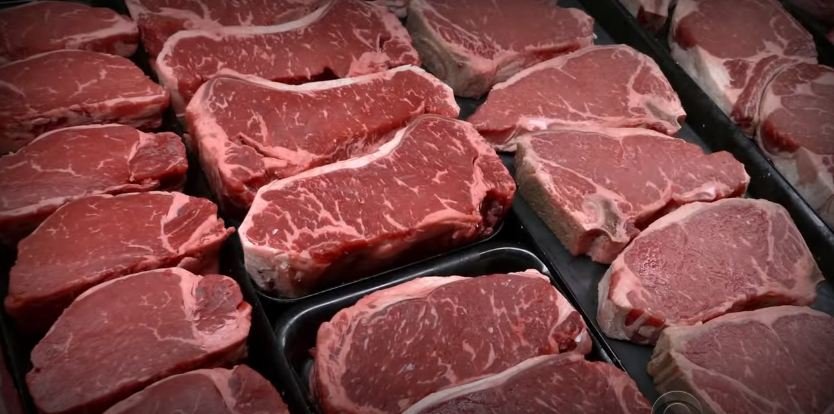When it comes to building muscle, there is no one-size-fits-all solution. Everyone has their own dietary preferences and needs that they need to take into account. That said, there are certain foods that should be avoided when trying to build muscle mass. These foods can have a negative impact on your progress, either directly or indirectly.
In this article, we’ll explore 5 foods to avoid when building muscle so you can make sure you’re giving yourself the best chance of success! We’ll cover a variety of different food groups and discuss why they’re not conducive to your goals. Read on to learn more!
Here are 5 foods to avoid when trying to build muscle fast:
1. Processed Meats

Processed meats like bacon, sausage, and deli meat are high in saturated fat and sodium, which can lead to weight gain and bloating. They also don’t have much protein, so they’re not ideal for building muscle. In addition to it, eating hot dogs is not ideal for muscle building due to their high content of unhealthy fats, salt, and preservatives.
These ingredients can lead to inflammation, high blood pressure, and other health problems that can negatively impact muscle growth and recovery.
2. Refined Carbs

They are surely harmful to developing muscles. White bread, pasta, and sugary snacks are examples of refined carbohydrates that are easily absorbed into the bloodstream and cause sharp increases in insulin and blood sugar levels.
Inflammation and slowed muscle growth may result from this. A diet rich in refined carbs can also contribute to a collapse in energy levels, which can result in weariness and poor workout performance.
Focus on consuming complex carbs, which assist muscle growth and recovery and give sustained energy, such as whole grains, fruits, and vegetables. To help control blood sugar levels and advance general health, combine your carbohydrates with lean protein and healthy fats.
3. Trans Fats

Trans fats are found in processed foods like margarine, chips, crackers, and cookies. They’re terrible for your health and will promote fat gain. Avoid them at all costs!
Trans fats are detrimental to both overall health and muscular growth. By adding hydrogen to liquid vegetable oils, a process known as hydrogenation transforms them into solid trans fats. Processed foods including baked goods, fried dishes, and snack items frequently include these trans fats.
Consuming trans fats has been related to a range of health issues, such as heart disease, stroke, and elevated inflammation.
4. Alcohol

Alcohol is calorie-dense and can lead to weight gain if you’re not careful. It also inhibits muscle growth and recovery, so it’s best to avoid it if you’re trying to bulk up quickly. alcohol can negatively impact muscle building. Here’s why:
- Dehydration: Alcohol is a diuretic, which means it causes the body to lose fluids. Dehydration can impair muscle function and slow down muscle recovery.
- Reduced Testosterone: Testosterone is an important hormone for muscle building, and alcohol consumption has been linked to lower testosterone levels in men.
5. Processed vegetable oils

Oils from processed vegetables are not the best for growing muscle. Soybean oil, corn oil, and canola oil are examples of oils that are low in omega-3 fatty acids and high in omega-6 fatty acids. Inflammation brought on by this fatty acid imbalance can impede muscle growth and repair.
Furthermore, processed vegetable oils are frequently heavy in toxic trans fats and frequently heated during processing, both of which can result in dangerous by-products.
Instead, concentrate on consuming healthy fats from foods like avocados, nuts, seeds, olive oil, and fatty fish because they provide the vital fatty acids required for both muscle growth and good health.
How to gain muscle fast for skinny guys?
If you’re a skinny guy looking to gain muscle fast, here are some tips that may help:

Start Resistance Training: Incorporate weightlifting or resistance training into your exercise routine. Focus on compound movements such as squats, deadlifts, and bench presses, as these exercises work for multiple muscle groups and help to promote muscle growth.
Progressive Overload: Continuously increase the weight you lift over time to challenge your muscles and promote growth.
Adequate Protein Intake: Make sure you are consuming enough protein to support muscle growth. Aim for 1 to 1.6 grams of protein per kilogram of body weight per day.
Eating Enough Calories: In order to gain muscle, you need to be in a calorie surplus. This means you need to consume more calories than you burn. Aim for an additional 500-1000 calories per day, but make sure the majority of these calories come from nutrient-dense sources such as lean meats, whole grains, and vegetables.

Get Enough Sleep: Sleep is important for muscle recovery and growth. Aim for 7-9 hours of sleep per night.
Try to Be Consistent: Consistency is key when it comes to building muscle. Stick to a consistent workout routine and make sure you are following a healthy diet.
We suggest skinny guys focus on eating lean proteins, such as chicken, fish, turkey, eggs, and dairy, which provide the essential nutrients needed for muscle building and recovery. Additionally, include a variety of fruits, vegetables, and whole grains in your diet to ensure you’re getting the vitamins, minerals, and other nutrients.
One’s beginning muscle mass, training background, nutrition, and hormone levels, as well as other variables, all affect how much muscle one can add in a month.
Beginners can often anticipate gaining 1-2 pounds of muscle every month, whereas experienced athletes may only be able to add 0.5–1 pounds of muscle per month. It’s vital to remember that building muscle takes time and that regular, progressive resistance training and getting enough protein are crucial for fostering muscle growth.
It’s also important to note that quick increases in muscle mass frequently reflect an increase in glycogen or water retention rather than genuine muscle growth. It is important to focus on gradual, consistent progress rather than trying to achieve rapid gains, as this approach is more sustainable and less likely to lead to injury.
What foods make you gain weight the fastest?
When it comes to gaining weight, certain foods can help you pack on the pounds faster than others. Here are some of the best (and worst) foods to eat when you’re trying to bulk up:
Best Foods for Gaining Weight:
1. Potatoes: Both sweet and regular potatoes are great for weight gain. They’re packed with carbohydrates and calories, and they’re easy to eat in large quantities.
2. Rice: Like potatoes, rice is a great source of carbs and calories. It’s also versatile and can be used in a variety of dishes.
3. Nuts and nut butter: Nuts are high in fat and calories, making them ideal for gaining weight. Just be sure to avoid processed nut butter, as they often contain added sugar and oil. Because they are often an unhealthy food intake for building muscle.
4. Red meat: Red meat is a great source of protein, iron, and other nutrients that are essential for muscle growth. Just be sure to choose lean cuts of meat to avoid excess saturated fat.
5. Whole milk: Whole milk is an excellent source of calories, protein, and other nutrients needed for muscle growth. It can also help you feel fuller longer, which may encourage you to eat more overall.
Muscle-building tips from experts
Here are some tips for building muscle effectively, according to experts in the field:

Consistency: Building muscle requires consistent effort and dedication. Aim to strength train at least 2-3 times per week and be consistent with your workouts and diet.
Variety: Doing a variety of exercises for each muscle group can help ensure balanced development and reduce the risk of injury.
Proper Form: Using proper form during exercises is important not only for preventing injury but also for maximizing the effectiveness of each workout.
Rest and Recovery: Your muscles grow and repair themselves during periods of rest, so it’s important to get enough sleep and allow for adequate recovery time between workouts.
Mind-Muscle Connection: Engaging the mind-muscle connection during strength training can help you get the most out of each exercise and maximize muscle activation.
Hydration: Staying hydrated is essential for muscle function, recovery, and growth. Make sure you’re drinking enough water throughout the day. Remember that everyone’s body is different, and what works for one person may not work for another. It’s important to listen to your body, be patient, and make adjustments as needed.
Conclusion
When it comes to building muscle, there are certain foods that you should avoid. These foods can sabotage your hard work and prevent you from reaching your goals.
Some of the worst offenders are processed foods, sugary drinks, and alcohol. Ultra-processed foods are loaded with unhealthy ingredients that can make it difficult to build muscle and lose fat. Sugary drinks are full of empty calories that can lead to weight gain. Alcohol can dehydrate your body and hinder muscle growth.
To reach your full potential, it is important to fuel your body with healthy food choices. Choose lean protein sources, complex carbohydrates, and healthy fats. These nutrients will help you build muscle and stay lean. Avoiding processed foods, sugary drinks, and alcohol will help you reach your goals faster.
Related search:
